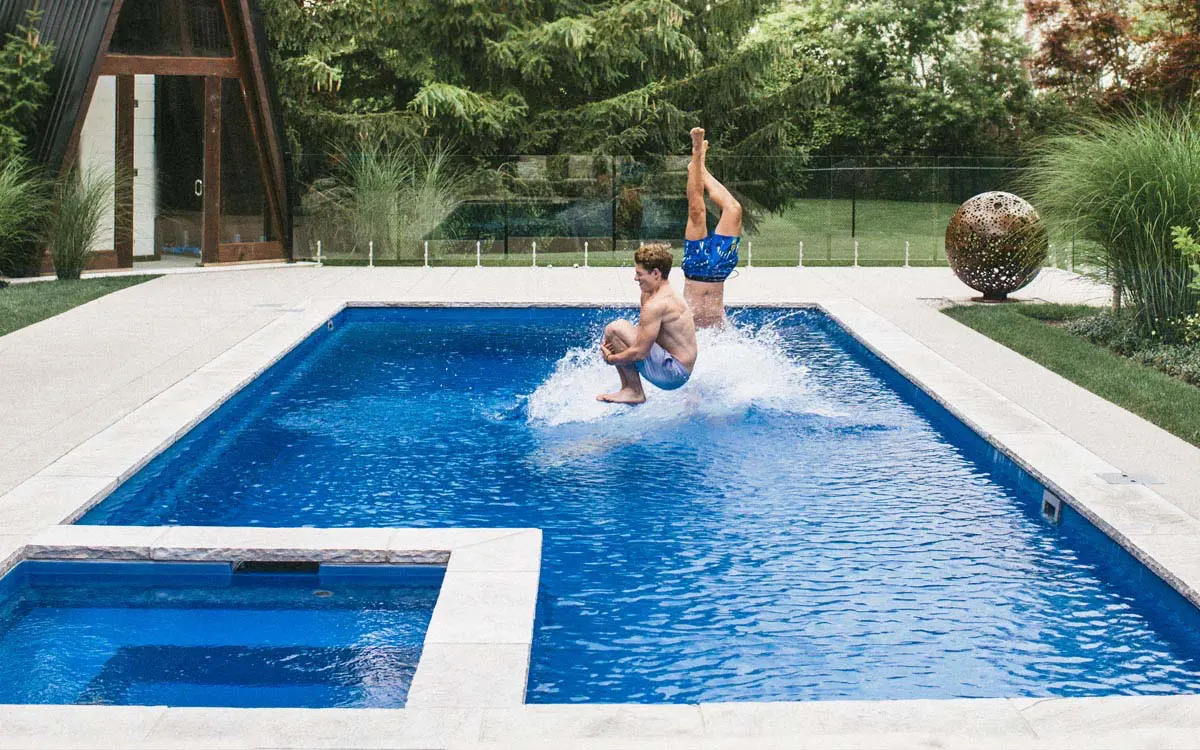
Salt Water Chlorinator: Perfectly Suited for Fiberglass Pools
Introduction
Imagine diving into a pool with water so soft and refreshing that it feels like swimming in a luxury spa. The gentle sensation on your skin, the absence of harsh chemical smells, and the crystal-clear water create an unmatched swimming experience.
Many people assume that saltwater pools are just like swimming in the ocean—harsh, salty, and corrosive—but that’s far from the truth. In reality, a salt water chlorinator provides a smooth, balanced, and low-maintenance way to keep your pool clean without the drawbacks of traditional chlorine pools.
In this article, we’ll explore why a salt water chlorinator is the perfect match for fiberglass pools. From cost savings to environmental benefits, we’ll cover everything you need to know about this game-changing pool sanitation system.
What is a Salt Water Chlorinator?
Definition & Function
A salt water chlorinator, also known as a salt chlorine generator, is an advanced pool sanitation system that converts salt into chlorine through a process called electrolysis. Unlike traditional chlorine pools that require frequent chemical additions, a salt water chlorinator continuously produces chlorine, ensuring that your pool remains clean with minimal effort.
How It Works
- Salt is added to the pool water. The salt concentration is much lower than seawater—typically around 3,000 parts per million (ppm), compared to the ocean’s 35,000 ppm.
- The salt water chlorinator uses an electrode cell to break down the salt. This process generates hypochlorous acid, the same sanitizing agent found in chlorine pools.
- The result is clean, clear water. The system maintains a consistent chlorine level, reducing the need for frequent chemical adjustments and minimizing irritation to the skin and eyes.
Benefits of Salt Water Chlorinators
Softer, Gentler Water
- One of the most noticeable benefits of a salt water pool chlorinator is the softer feel of the water.
- Traditional chlorine pools can cause skin and eye irritation, while saltwater pools provide a more comfortable swimming experience.
- The water feels silkier and more natural, making it ideal for families and those with sensitive skin.
Lower Chemical Handling
- A salt chlorine generator eliminates the need for storing and handling large amounts of chlorine.
- The system continuously produces chlorine, reducing the risk of bacteria and algae growth.
- This automated process minimizes the need for frequent chemical balancing, making maintenance easier.
Cost Efficiency Over Time
- While the initial investment in a pool salt chlorinator is higher than traditional chlorine systems, the long-term savings are significant.
- With fewer chemical purchases and reduced maintenance costs, pool owners can save money over time.
- The system also extends the lifespan of pool equipment by providing a more stable and balanced water environment.
Why Fiberglass Pools Are Ideal for Salt Water
Durability and Resistance to Corrosion
- Fiberglass pools are non-porous, meaning they are highly resistant to salt’s effects, unlike concrete or vinyl pools.
- Unlike concrete, fiberglass does not degrade or require resurfacing, making it the perfect material for a salt water pool chlorinator.
Low Maintenance
- The smooth, gel-coated surface of fiberglass pools resists algae buildup, requiring fewer chemicals and less frequent cleaning.
- This makes fiberglass pools an excellent choice for homeowners looking for a low-maintenance pool solution.
Comparison with Concrete Pools
Porosity Issues
- Concrete pools are highly porous, which means they absorb water and require more chemicals to prevent algae growth.
- This results in higher chlorine demand, making a salt water chlorinator less efficient in maintaining stable chlorine levels.
Higher Maintenance Costs
- Concrete pools require frequent resurfacing and sealing to prevent salt-related damage.
- Over time, this adds significant costs and maintenance demands.
Rough Surface Discomfort
- Unlike the smooth surface of fiberglass pools, concrete pool surfaces can be rough on swimmers’ feet and cause discomfort.
Comparison with Vinyl Pools
Metal Component Concerns
- Many vinyl pools contain metal wall panels, which can rust over time due to salt exposure.
Liner Replacement Costs
- Vinyl liners can degrade faster in saltwater, leading to more frequent replacements.
- This adds to the long-term expenses of maintaining a vinyl pool.
Higher Long-Term Expenses
- While vinyl pools may have a lower initial cost, liner replacements and increased maintenance costs make them more expensive over time.
Long-Term Cost Savings
Less Need for Chemicals
- Traditional chlorine pools require frequent chemical adjustments and shock treatments.
- A salt chlorine generator maintains a steady chlorine level, reducing the need for additional chemical expenses.
Fewer Repairs and Maintenance Costs
- Fiberglass pools do not require resurfacing like concrete pools.
- The reduced wear and tear on pool equipment leads to fewer costly repairs over time.
Impact on Pool Water Quality
Crystal-Clear Water
- A salt water pool chlorinator provides consistent chlorine levels, resulting in clearer, cleaner water.
Less Eye and Skin Irritation
- Unlike traditional chlorine pools, saltwater pools reduce the presence of harsh chemical byproducts, leading to a more comfortable swimming experience.
More Enjoyable Swimming Experience
- The water feels softer and more natural, making swimming more enjoyable for all ages.
Environmental Benefits
Reduced Chemical Use
- A salt chlorine generator reduces reliance on traditional chlorine, meaning fewer harsh chemicals enter the environment.
Lower Water Consumption
- Fiberglass pools require fewer water refills compared to concrete pools due to reduced chemical evaporation and water loss.
Eco-Friendly Pool Maintenance
- Saltwater pools promote a more sustainable approach to pool care, reducing chemical waste and environmental impact.
Ease of Maintenance
Fewer Algae Problems
- The non-porous surface of fiberglass pools discourages algae growth, reducing the need for frequent cleaning.
Automatic Chlorine Generation
- A pool salt chlorinator continuously produces chlorine, reducing the need for manual adjustments.
Less Frequent Cleaning
- With fewer contaminants and stable chlorine levels, overall maintenance time is significantly reduced.
Salt Concentration Misconceptions
Not as Salty as the Ocean
- Many people mistakenly believe that saltwater pools are as salty as the ocean.
- In reality, they contain only about 1/10th of the salt found in seawater, making the experience much gentler.
Feels More Like Freshwater
- The low salt concentration makes the water feel closer to freshwater than seawater, ensuring a pleasant swimming experience.
Conclusion
A salt water chlorinator offers a superior pool experience with softer water, reduced maintenance, and long-term cost savings. When paired with a fiberglass pool, the benefits are even greater—durability, low upkeep, and an eco-friendly approach to pool care make this combination the ideal choice for homeowners.
If you’re considering upgrading your pool, a fiberglass pool with a salt water pool chlorinator is a smart, long-lasting investment. For more information on fiberglass pools and saltwater systems, contact the professionals at Backyard Pool Patio’s contact page today!


